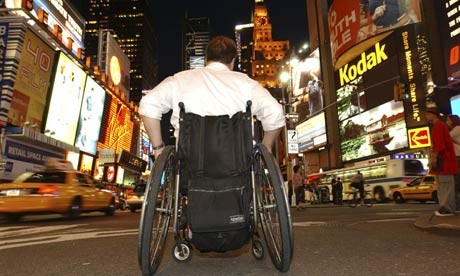Top 10 Europe Handicapped Travel Tips.
Top 10 Europe Handicapped Travel Tips.
John Sage is the founder of Sage Traveling (www.SageTraveling.com). This company is committed to providing customized accessible holiday travel. They deal exclusively in disabled travel to Europe and make it their job to understand all the challenges that disabled travelers may encounter and how to overcome them. Sage Traveling offers comprehensive, detailed, and organized disabled travel information on accessible European tourist attractions, hotels, and transportation.
John Sage was injured in a snow-skiing accident in 2001 when he was 22 and sustained a T-4 incomplete spinal cord injury. He has some sensation but uses a wheelchair to get around. John quickly adapted to his new lifestyle and retained his passion for life. Since 2001, he has visited Europe 16 times to over 90 cities in his wheelchair.
John Sage has spent the past several years learning accessibility phrases in various languages to be able to call hotels and museums to inquire about accessibility. He has taken numerous trips to top European travel destinations to make Sage Traveling a leading expert in disabled European travel.
Top 10 Europe Handicapped Travel Tips, based on personal experiences:
This tips come from experiences from traveling with a wheelchair to over 80 cities in Europe and planning countless trips for other disabled travelers.Prepare well for your trip, follow these Top 10 Europe Handicapped Travel Tips, and travel with an open mind?.you?ll be sure to have a great accessible European vacation!
1. Plan ahead, plan ahead, plan ahead ? I hear all the time that "Venice is not wheelchair accessible" or "Paris has poor accessibility". While there are certainly some accessibility challenges, the truth is that the more accessibility research you do, the more accessible your trip will be! Avoiding bridges in Venice and hills in Paris is entirely possible!
Did you know that Herculaneum has nearly identical ruins as Pompeii but is very wheelchair friendly? And that disabled cruise passengers don?t have to take the "donkey path" up the cliffs when visiting the island of Santorini? Nearly every accessibility barrier can be overcome or circumvented with the right amount of planning. Your vacation doesn?t need to be a struggle filled with a handful of good moments?plan ahead and your vacation will be filled with fully accessible hotel accommodation, accessible routes between accessible tourist attractions, and wonderful accessible travel experiences. Do your homework before your trip?.it will be well worth it!
2. Book hotels far in advance ? The decision about the timing to book my hotel room is usually based on the question "how far in advance do I need to look for hotels to find one?" Maybe this is the wrong question!
When getting started planning trips to the same destination over and over again then is when you realized this Europe handicapped travel tip: It is almost always cheaper to book your accessible hotel accommodation FAR in advance. Many disabled hotels in European city centers have only 1 or 2 disabled hotel rooms. The best ones get booked very far in advance! We often plan trips for people 9 months in advance and place them in the most affordable, most accessible, most centrally-located hotel rooms. If you?re traveling in the summer, you should make your reservations in December!
3. Your accessible guided tours will likely be the best memory that you have ? We hear it time and time again. Seeing a beautiful city like Florence or a bustling city like London is a great experience. But to truly appreciate the special characteristics of the city, you?ll need a tour guide to point out the fascinating hidden history behind what you?re seeing.
Without a tour guide, you might walk/roll right past Hitler?s bunker in Berlin, the spot where St. Peter preached in Athens, or the location of the infamous guillotine in Paris. Tour guides will not only show you the city?they?ll bring you back in time to experience everything that has happened in the city. One that specializes in accessibility will be able lead you on the flattest, smoothest, shortest tour routes! Find a great tour guide and you?ll leave with unforgettable memories!
4. Carefully plan your route ? If you know what you?re getting into before you arrive, you?ll have a much easier time on your trip. Often there are numerous options to get between the various tourist attractions that you?re so eager to see. Some routes will have wheelchair ramps, smooth pavement, and flat terrain. Others can have steep hills, bothersome (and even dangerous!) cobblestones, and flights of stairs.
Europe Handicapped Travel Tip #4 says to research accessibility of sidewalks, bus routes, subway stations, and the location of accessible building entrances before your trip so you can spend your visit enjoying your vacation!
5. Stay in the most accessible parts of town ? It?s one of the most difficult parts of planning your accessible trip. You may have found a great accessible hotel, but what will you find when you walk/roll out the front door? Are there hills in all directions? Will you have to roll over cobblestones to get anywhere? Are there accessible restaurants nearby?
It?s crucial to not only investigate the accessibility of the hotel, but also the neighborhood it?s located in. Dining at a charming accessible restaurant in Venice will be much more enjoyable than eating in the hotel.
6. Figure out your accessible public transportation options ? When choosing a hotel, don?t forget to factor in the price of transportation. If you have to pay for a taxi to get to accessible restaurants, accessible shopping, and the tourist attractions, that hotel "deal" you found won?t feel so like such a good deal.
In cities like London, Paris, and Barcelona, stay near one of the accessible bus stops. In cities like Berlin, Istanbul, and Venice, stay near one of the accessible metro, tram, or boat stops. In cities like Florence, Cambridge, and Edinburgh, stay right in the middle of town so that you can walk/roll everywhere!
7. Rely on the experience of other Europe handicapped travelers ? You?re almost certainly not the first disabled person to visit your destination. Find out the accessibility challenges that other disabled travelers encountered and how they got around them. You can check the various online travel forums to find previous traveler experiences. If you do, be sure the information is not out of date. If you don?t, you might look for the wheelchair lifts on Venice bridges (taken out of service), show up at the Picasso Museum in Paris (closed for renovations during 2012), or miss out on the accessible London Tube Stations (massive renovations in progress).
If you don?t want to spend the time finding out what internet information is out of date, you can utilize the assistance of an accessible travel agent who stays current on the ever-changing accessibility landscape.
8. Choose the right time of year for your destination ? Many European destinations have times of year you should avoid. Visit Venice in November, and you could end up trapped by extensive flooding
Northern attractions could be cold outside of summer months, and Naples will be scorching during July and August. In Paris, the city will shut down on July 14th for Bastille Day, and virtually everywhere will shut down on May 1st for Labor Day. A great European accessible vacation will require great timing!
9. Have a back-up plan ? On even the most perfectly planned accessible vacation, things can go wrong when traveling with a disability. When it does, how will you deal with it? If you prepare for all the potential issues, unexpected events won?t turn into trip potential trip-ruining problems!
What will you do if a part on your wheelchair breaks? When a train strike occurs in Italy, how will you get between Florence and Rome? If your hotel has messed up your reservation, where will you stay? Know what your back-up plans are (or have someone who can take care of problems for you), and you won?t have to put your vacation on hold to figure out a solution.
10. Enjoy your trip! You?ve done as much planning as you can. You?ve relied on the experience of other disabled travelers, and you have back-up plans. Now it?s time to enjoy your trip! Majestic cities, beautiful art and architecture, fascinating history, exquisite food, and wonderful experiences await!
If you have mobility issues and you are visiting Madrid, you can hire your electric scooter in Madrid at Accessible Madrid . This company offers a home delivery service for electric scooter rentals in Madrid. If you are a disabled traveler, contact Accessible Madrid (www.accessiblemadrid.com). We are happy to help you with your accessible holidays in Madrid. Try our wide range of accessible services (transfers adapted van, accessible tours in Madrid, etc). We also offer tours and excursions at reasonable extent Toledo, Segovia, Salamanca, etc, always departing from Madrid. electric mobility scooters sales Madrid is also available.


